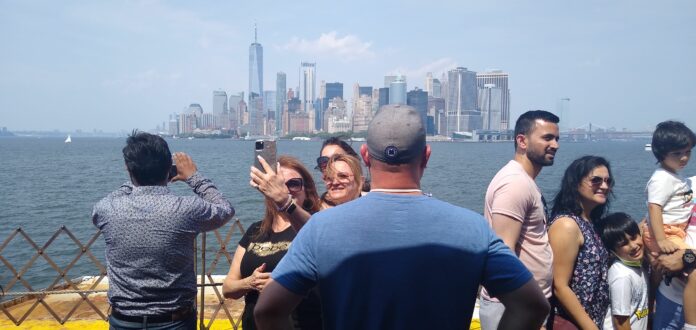
By Eric Valentine
This year, I got to celebrate the real America—the truly free one—one day before everyone else celebrated some other version of this country I’m having a harder and harder time relating to lately. The truth of the matter is I don’t know what’s in the hearts and minds of every American each Fourth of July when they watch or blast fireworks, sing the national anthem a little more fervently during a ballgame, or barbecue and eat a few more hot dogs than they needed to. But my sense is that it’s a different kind of patriotism than mine. And it wasn’t until July 3, 2021, during my vacation in New York City, that I truly understood what I love about this country.
I’ll set the stage, literally. On Saturday night my travel buddy Scott (Looney) and I headed to Greenwich Village to catch an improvisational jazz performance at a small, basement-level club called Smalls. Now, this is the part of the story where I’m supposed to at least try to impress you with which amazing household name performed that night or provide you with a litany of jazz legends who once graced the stage. Wikipedia it; I have no clue who any of those people are, or were.
This is also where I’m supposed to tell you something about jazz that makes you finally, after all your years of existence, have an a-ha moment and discover that it’s America’s greatest artistic contribution to Western civilization, or something of that nature.
Instead, I want to examine the mind-boggling, let’s call it no-name talent playing that night. And I’m going to go out on a limb and call the sounds I heard that night “impressive, but not the kind you hum in the shower the next morning and download online for playback the rest of your life.” Improv jazz—especially when sound mixed right like it was July 3—is rap-battle-meets-team-building exercise. It’s as stunning as it is not catchy. And that’s the extent of my musical knowledge on the matter.
The featured musician at Smalls was a black man who, over the course of the hour-long show, played each type of saxophone there is. Keeping both the core melody and rhythm for all—at times—five other musicians on stage was a standup bassist, a Latino 20-something wearing what had to be either ironic or a slap in the face to Yankees and Mets fans—a classic blue-and-white L.A. Dodger cap. On the drums was a white guy in a button-up shirt and gold glasses who looked a lot like a young Harold Ramis, the guy who, among other notable film industry things, starred in the hilarious Bill Murray movie called “Stripes” (all this is code for he had to be Jewish). On piano, a lady of some sort of Latina or Native American descent. I really don’t know, I wasn’t there working for ICE. They all started the night and played for about a half hour a series of riffs and runs and other jazz terms that I think I’m using correctly.
The next half hour turned the lead musician, the sax player, into more of an open-mic emcee. He would notice someone in the perfectly cramped audience pulling their instrument out of its case and he’d call them up to the stage, while the other musicians reduced their frantic pace of playing to just near-frantic—enough music space for the stage-entering musician to start his or her own etude—and yes, I had to look up that term to make sure it was right, and it is right.
The only thing more diverse than the original five musicians were the several replacements that followed. A Russian guy, who after the show I would learn was named—you guessed it—Vlad, took over the piano. A septuagenarian black lady took the mic and sang her heart out. The only person in the room older than her was a black trombone player who, after the show, was revered by the two Asian guitarist kids from the Manhattan School of Music who asked him if it were true he played with (some classical musician I never heard of). And then there was a middle-aged big bald white guy who took his trumpet skills to the stage, followed by the possibly Middle Eastern trombone player who was not out of his element either.
This was taking place in a city where already over a century ago ghettoized immigrants were profoundly aware of everyone’s differences but somehow coalesced in building this country from the ground up. Did I mention the obvious? Improvisational jazz has no practice, no plan. It is reactionary to the matter at hand. “No matter what’s thrown at us, it will be hurled back newer and better than before.” It is the musical metaphor for everything great about America. Fireworks, on the other hand, are the on-the-nose mini-replica of zero-sum battles and forever wars that seem to mostly keep us spinning our wheels. And my hope is that no matter where or how you celebrate July 4, 2022, a broader and fuller image of how you see this country’s role on planet Earth will be true.
